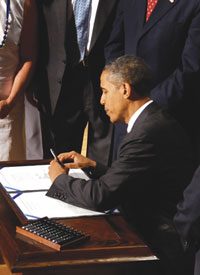
On Wednesday, July 21, President Obama triumphantly signed the latest plank in his bid to outdo Franklin Delano Roosevelt’s Depression-era radical expansion of federal government powers. While Obama’s overall program has yet to challenge the New Deal as the greatest federal power grab in U.S. history, the Dodd-Frank Wall Street Reform and Consumer Protection Act is certainly the most massive imposition of federal power ever inflicted on the financial sector.
In the sobering phraseology of Investor’s Business Daily’s Ernest S. Christian and Gary A. Robbins, “under Dodd-Frank, [Obama] and his agents will control all credit and financial transactions, rewarding friends and punishing opponents, discriminating on the basis of race, gender and political affiliation. Credit and liquidity may be choked by bureaucracy and politics — and the economy will suffer.”
Harsh words, seemingly, but not exaggerated a whit. The new bill is a staggering 2,300 pages long, and has nearly the word count of the King James Bible. No lawmaker who voted for the document — much less the President who signed it into law — has read the bill in its entirety. As with every bill of this kind, no one yet knows what nasty legal surprises are concealed in deliberately ambiguous phrases and artfully tucked away in myriad subsections that failed to attract the full scrutiny of lawmakers. And no one can possibly predict what new regulations — doubtless numbering in the tens of thousands of new pages of federal law — will emanate from the bureaucracies set up by Dodd-Frank. But there can be no doubt that President Obama’s finance reform bill will, as advertised, permanently reconfigure the American financial landscape, albeit not in ways many of its supporters envision.
Possibly the most burdensome feature of the new federal financial regulatory regime is the Bureau of Consumer Financial Protection, whose mission will be to regulate virtually every type of financial activity, ostensibly to protect American consumers from so-called “predatory lending practices” and other forms of fraud.
Bureaus and Offices
Created by Title X of Dodd-Frank, known as the “Consumer Financial Protection Act of 2010” (CFPA), the Bureau will be empowered to regulate all companies involved in consumer lending and their products and services, including, but not limited to, credit cards, mortgages, debit cards, consumer loans, payment systems, and bank accounts. The Bureau of Consumer Financial Protection will crack down on all forms of loan products where widespread abuses are supposedly being perpetrated, like credit cards, auto loans, overdraft loans, and student loans. Such “abuses” include excessive fees, interest, discriminatory profiling of loan applicants, and harsh approaches to debt collection. All of these practices, and much more, the federal government will now have almost unlimited authority to supervise.
Described (by the liberal think tank Americans for Fairness in Lending, hardly an unbiased source) as “an agency completely dedicated to protecting consumers from dangerous financial products,” the Bureau of Consumer Financial Protection will be divided into five sections, namely, Research, Community Affairs, Complaint Tracking and Collection, the Office of Fair Lending and Equal Opportunity (to ensure equitable access to credit), and the Office of Financial Literacy (intended to promote financial literacy among consumers). In other words, this ponderous new bureaucracy will not merely regulate financial activity, but will actively seek to “educate” (read: propagandize) consumers on the subject of finance — finance, that is, as the government perceives it.
This new regulatory bureaucracy-cum-financial propaganda ministry will, by design, be part of the Federal Reserve, the same organization that has been subject to withering (and, one hoped) revealing scrutiny only months ago, in view of its complicity in the financial meltdown and resulting worldwide recession (as well as many recessions and depressions prior to this one). Not long ago, proposals to audit the Federal Reserve and otherwise to hold America’s central bank accountable for debasing the dollar and precipitating the booms and busts of several generations were receiving a sympathetic hearing on Capitol Hill and in many media organs. Yet all proposals to limit the authority of the Fed and to expose its financial machinations to the light of day were quietly removed from Dodd-Frank. Instead of having its wings clipped or its affairs wound up altogether, the Federal Reserve and the monetary system it oversees have emerged with vast new powers, transforming the Fed from a central bank into something approaching a financial version of the Department of Homeland Security.
For, in the wake of Dodd-Frank, the Fed is a mere central bank no longer. Besides its formidable prior powers to manipulate the money supply by changing interest rates, buying and selling government debt, monkeying with currency exchange rates, and other feats of financial legerdemain, the Fed is now in effect the regulator of last resort of the entire financial sector and of all financial transactions anywhere in the United States.
Besides the aforementioned Bureau of Consumer Financial Protection, the new Fed will have direct authority to monitor and liquidate financial corporations deemed to be insolvent (Title III of Dodd-Frank) and will also have an “enhanced role in the supervision of risk management standards for systemically important financial market utilities; strengthening the liquidity of systemically important financial market utilities; and providing the Board of Governors an enhanced role in the supervision of risk management standards for systemically important payment, clearing, and settlement activities by financial institutions” (Title VIII). That is, the Fed will have direct regulatory and supervisory discretion over companies whose failure could put the entire financial system in jeopardy. The Chairman of the Federal Reserve will be one of the 10 members of the new Financial Stability Oversight Council, which will be tasked with maintaining investor confidence (presumably by disinformation), encouraging market discipline (whatever that may mean), and enhancing the stability and effectiveness of U.S. markets. Put simply, the post-Dodd-Frank Fed will not only be able to print money, but also to dictate the way much of it is spent and by whom.
If the new Fed is the centerpiece of the financial reform legislation, there are many other ancillary features destined to misshape American finance for generations to come. There is, for example, the aforementioned Financial Stability Oversight Council, chaired by the Secretary of the Treasury, whose 10 voting members will meet at least quarterly to assess risks to the U.S. financial system. The council will issue regulatory recommendations to financial regulatory agencies, and may compel the Fed to assume direct regulatory oversight of corporations deemed to pose a “systemic risk.” The council’s powers to monitor, investigate, and assess systemic risk are extremely broad, including the authority to collect information from any federal or state financial regulatory agency.
A special new bureaucracy to regulate the insurance industry, the Federal Insurance Office, is created by Title V. This agency will not only have the power to monitor and regulate all aspects of the insurance industry, it will also be tasked with the politically correct mission of helping to ensure that minority communities who are allegedly discriminated against have access to insurance services. This kind of affirmative action is reminiscent of the Community Reinvestment Act (CRA), whose efforts to prevent allegedly discriminatory lending practices helped to create the subprime mortgage debacle. Title XII (the “Improving Access to Mainstream Financial Institutions Act of 2010”) continues in a similar vein, providing incentives like financial counseling and government grants to low and middle-income people to take part in the financial system, people who, according to received wisdom, often “fall through the cracks” as a result of not being able to receive loans or open bank accounts.
The Problems With Overprotection
The entire spirit of Dodd-Frank is to protect American consumers from themselves, by ensuring that the federal government enjoys comprehensive control and oversight over all financial activities large and small, and by (re)educating Americans in modern finance as defined by government-anointed experts (including, of course, experts sympathetic to the Federal Reserve and its mission).
But why would Americans need such coddling and protection in the first place? Inasmuch as freedom is everywhere coupled with responsibility, so too is financial freedom paired with the age-old laissez-faire principle caveat emptor, “let the buyer beware.” It was once widely believed that consumers are responsible for the decisions they make, to evaluate the merits of the products they purchase. In the financial sector, that would include accepting interest rates, terms of repayment, and the assessment of fees. If a consumer accepts an interest rate of, say, 15 percent, along with penalties for late payments and the like, it then cannot be considered fraudulent for the lender to charge agreed-upon interest rates and fees. If interest rates are regarded as excessive or fees punitive, then consumers are free to seek elsewhere for credit and other financial services.
At the same time, financial service providers operate on a “seller beware” basis, screening applicants for creditworthiness before loaning money to them, and trying to maintain a reasonable profit margin. The dynamic interplay of consumer demand — the lowest possible interest rates and most accommodating fee structures — with expectations of banks and other providers of financial services — maximum return on investment — will provide, in a free-market milieu, optimal interest rates and other terms of financial contracts for both providers and consumers.
That, at least, is the way things used to work in the entire U.S. economy. But in the modern view, caveat emptor is no longer sufficient. Instead, “consumer protection” is routinely trotted out as the central justification for squelching the ability of consumers to make private, informed decisions. In the medical and pharmacological sectors, for example, consumers are deemed too uninformed to possibly be capable of making their own choices about healthcare, health insurance, and pharmaceutical products. As a consequence, we now have a national healthcare system where the quasi-governmental HMO reigns supreme (severely limiting consumers’ choices of healthcare providers) and new drugs take years to secure regulatory approval — while existing drugs cost a mint and Americans are prohibited from seeking lower-cost options, like cheaper drugs from Canada. And the new Obama healthcare regime will shortly begin compelling Americans to purchase health insurance and otherwise further straitjacket the healthcare sector.
With myriad new bureaucracies brought into being by Dodd-Frank, the obsession with “consumer protection” is now being imposed on the financial sector. Said Senator Dick Durbin (D-Ill.), “We don’t say ‘buyer beware’ when people are buying prescription drugs, or when they’re concerned about lead paint in toys, but when Americans purchase financial products … they often have little idea what those products … contain and whether or not they’re good for their families.”
This is no doubt true in many instances, but much of America’s ignorance of finance stems from the widespread expectation that the government will protect them from the consequences of bad financial decisions. Few Americans today make inquiries concerning a bank’s financial soundness before opening a savings or checking account, and fewer still have any idea how stock and bond markets work. It is fashionable to deride credit card issuers for high interest rates and penalties, but few bother to consider that credit cards are in effect unsecured, very high-risk loans for which higher rates of interest are intended to cover the much greater risk of default. All of this is elementary economics and finance, but too many Americans are mired in the mentality of entitlement in the guise of “consumer protection” and lack incentive to educate themselves in such matters.
Much the same could be said of adjustable rate mortgages, which droves of homebuyers took out in the expectation of an ever-expanding economy and vertiginous increases in assets and earning power. Everyone who has ever signed on the dotted line of a mortgage agreement knows that he is taking a risk; after all, employment and health are never guaranteed, and acts of God like floods and tornadoes can wipe out in an instant the fruits of dec-ades of labor and savings. Yet when the bottom fell out of the real estate market, the providers — not the consumers — of adjustable-rate mortgages were blamed for the ensuing epidemic of foreclosures. Accordingly, the new bureaucracies created by Dodd-Frank will dedicate substantial energy to micromanaging the mortgage industry, to forestall the formation of the alleged chains of fraud that set the world up for the subprime meltdown.
Fraud and Bad Faith
None of which is to say that fraud does not occur, even under optimal market conditions. It does. But genuine fraud consists of deliberately failing or refusing to uphold agreed-upon terms of an agreement, or in unilaterally changing the terms of the agreement after the fact. The hard truth is that consumers, not providers, of financial services commit fraud far more frequently. Every borrower who takes out a mortgage believing that, if his job sours, he can always “walk away” is entering a contract in bad faith. Every credit card owner who walks away from thousands of dollars of debt irresponsibly incurred is guilty of dishonesty. And every student who defaults on a student loan because the burden of repayment is too unattractive is contributing to a culture of consumer fraud that has encouraged frivolous borrowing for several generations. And all of us are acquainted with the epidemic of “identity theft” whereby the dishonest steal credit from the honest. All such activities are legitimately punishable by law.
But redefining fraud as offering a product for a price that is deemed too high or a structure too complex by regulators is the antithesis of the free market. Empowering government regulators to trump consumer choice in determining fair terms of goods and services is premised on the irrational notion that, whereas the private sector is inherently vicious, self-seeking, and untrustworthy, the public sector — and especially unelected bureaucrats — is virtuous, disinterested, and altruistic.
The opposite is true, as experience has borne out again and again. It is government bureaucrats who routinely behave without regard for the well-being of the private sector, by extending preferential regulatory treatment for interest groups with the deepest pockets and most vociferous lobbyists, and by refusing to consider the long-term effects of the regulations they write. It is also government that — unlike the private sector — routinely evades responsibility for the consequences of its short-sighted actions. For this reason, government controls over the private sector always produce more cronyism, public-private collusion, and impositions on the “little guy,” and encourage industry consolidation and the formation of monolithic, even monopolistic, corporate entities rather than innovative start-ups and healthy competition. This is already the complexion of things in the banking sector, and will now, thanks to financial reform, be extended to the rest of the financial sector.
It will be at least a year and a half before the real impact of Dodd-Frank begins to be felt, since the new bureaucracies are expected to take at least 18 months before promulgating the first new wave of regulations. After that, expect the once-vibrant American financial sector to slowly ossify as the bony overgrowth of government regulation destroys the flexibility and innovation that were once hallmarks of American finance. Should the much-ballyhooed Republican takeover of Congress occur in November, a top priority for the new opposition Congress should be to repeal this entire bill before it can stifle permanently our free-market system.
— Photo of Obama signing the Dodd-Frank bill: AP Images



